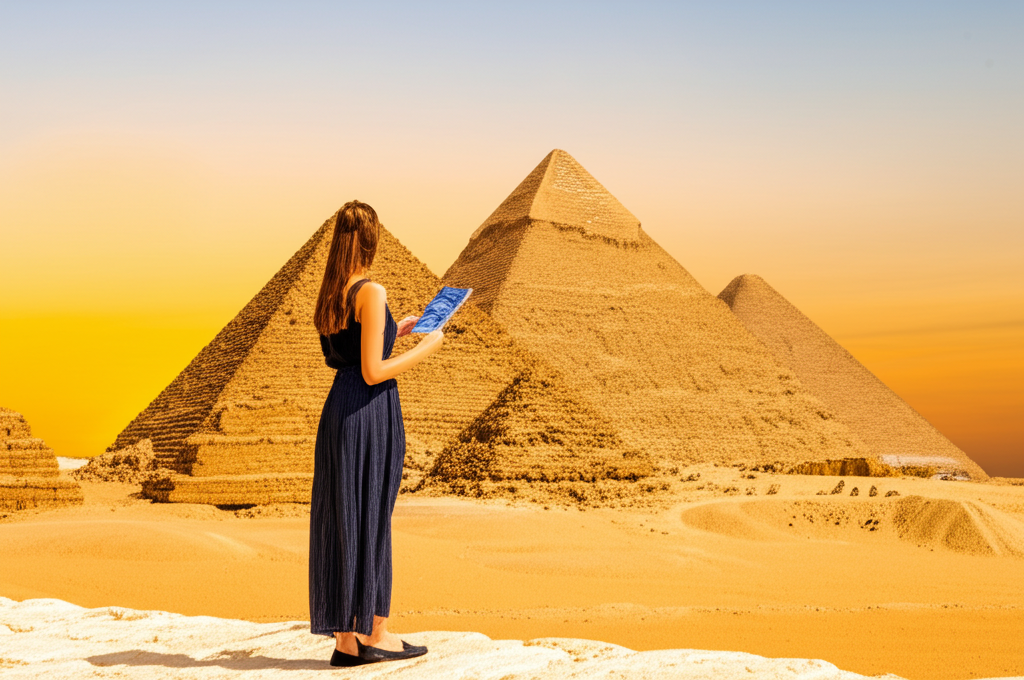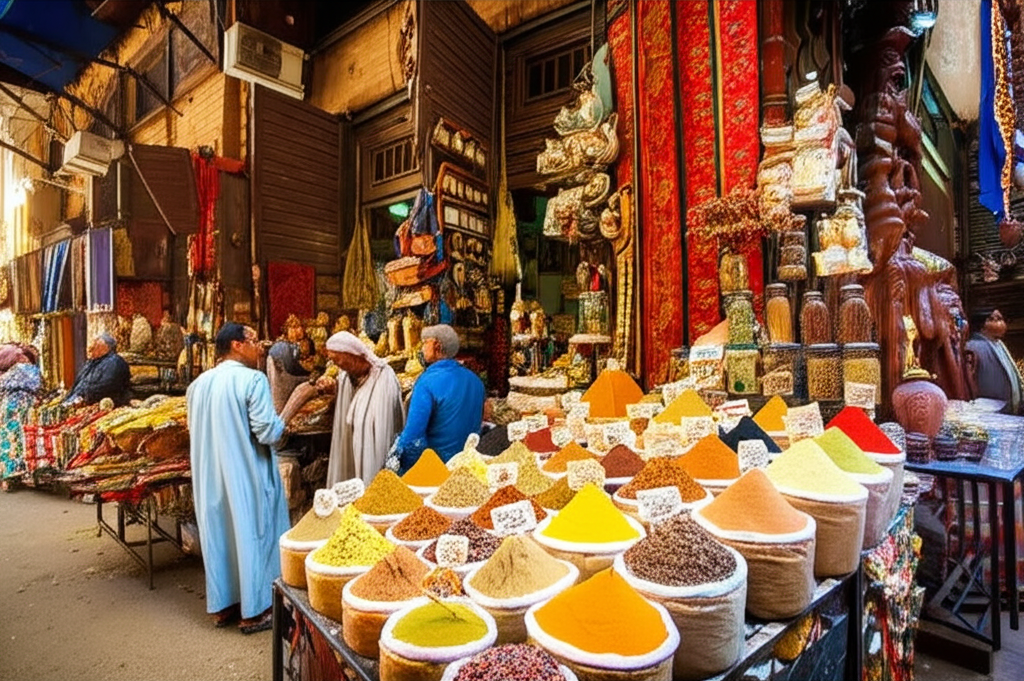A Comprehensive Guide to Independent Travel in Egypt: Costs & Detailed Itinerary
Estimated reading time: 15 minutes
Key Takeaways
- Independent travel in Egypt offers the opportunity to explore ancient wonders and experience a cruise on the Nile.
- Thorough planning is essential, including understanding visa requirements, cultural norms, and transportation challenges.
- Must-visit destinations include the Giza Pyramids, the Valley of Luxor, Aswan, and Alexandria.
- Estimated costs include food, transportation, accommodation, and entrance fees.
- Safety and security are important factors to consider when traveling independently in Egypt.
Table of Contents
Introduction
Independent travel in Egypt gives you the chance to explore ancient wonders like the Giza Pyramids and experience a cruise on the Nile. To ensure a successful trip, thorough planning is crucial, including a clear understanding of visa requirements, cultural rules, and transportation challenges. This guide will provide you with a detailed plan for your independent travel to Egypt (independent travel in Egypt).
Preparation Before Departure
Visa Requirements
Most travelers to Egypt need a visa, which can be applied for online (e-visa) or upon arrival. The online process is quicker but requires advance planning. There are a few exemptions for specific areas like the Sinai resort areas. You can learn more about visa requirements at here and here.
Vaccinations and Health Precautions
While no vaccinations are mandatory, it is recommended to get vaccinations for common diseases like MMR, along with hepatitis A, typhoid, and rabies. Bring a reusable water bottle with a filtration system, as tap water is not safe to drink. Refer to more information on vaccinations and health at here and here.
Essential Packing List
- Light clothing covering shoulders and knees to respect the culture.
- Comfortable walking shoes.
- Sun protection (hat, sunscreen).
- Reusable water bottle and snacks.
- Electronic devices and offline entertainment (Wi-Fi may be unstable).
- Local currency (Egyptian pound) and small change for tips (baksheesh).
Refer to more on packing lists at here.

Suggested Itinerary
Cairo (Day 1-3)
During the first three days, you will explore the Giza Pyramids, Saqqara, and the Great Sphinx. Don’t miss the opportunity to explore Islamic Cairo, Khan el-Khalili market, and the Egyptian Museum (or the Grand Egyptian Museum if it is fully opened). You can also enjoy a dinner cruise on the Nile. For more on the itinerary, check here, here, and here.
Aswan (Day 4-5)
In Aswan, you will visit the Abu Simbel temples (day trip) and Philae. You can relax at the historic Old Cataract Hotel or stay at Nubian guesthouses on Elephantine Island.
Luxor (Day 6-10)
In Luxor, you will visit Karnak, the Luxor Temple, and the Valley of the Kings. You can take a hot air balloon ride over Luxor and a Nile cruise between Aswan and Luxor for beautiful scenic views.
Add-On Points
You can enhance your trip by visiting Alexandria to explore Greco-Roman sites like the Catacombs of Kom El Shoqafa and the Qaitbay Citadel, or the Red Sea resorts for scuba diving and snorkeling.
Transportation
Independent Transportation Options in Egypt
- Airplane: The fastest option but more expensive for long distances like from Cairo to Aswan or Luxor.
- Train: An affordable and convenient option for routes along the Nile. Sleeper trains offer comfort for overnight trips.
- Bus: A budget-friendly option for destinations outside the Nile but slower and less reliable.
- Taxi/Private Car: Ideal for flexibility, especially in remote areas. Always negotiate the price beforehand.
Pros and Cons of Transportation Options
- Airplane: Pros are speed; cons are high costs.
- Train: Pros are affordability and comfort; cons are longer travel times.
- Bus: Pros are savings; cons are slowness and less reliability.
- Taxi/Private Car: Pros are flexibility; cons are the need to negotiate prices.
Tips for Effectively Using Egypt’s Transportation System
- Always check schedules and ticket prices before departure.
- Use apps or websites to book tickets in advance, especially for trains and flights.
- When using taxis, negotiate prices before getting in.

Accommodation
Types of Accommodation Available in Egypt
- Budget: Hostels or local inns (e.g., Elite Pyramids Boutique Hotel).
- Mid-range: Local guesthouses in Nubian villages or affordable hotels.
- Luxury: Marriot Mena House Cairo or Sofitel Old Cataract Hotel in Aswan.
Budget and Luxury Accommodation Recommendations
- Budget: Elite Pyramids Boutique Hotel in Cairo, Nubian guesthouses in Aswan.
- Luxury: Marriot Mena House Cairo, Sofitel Old Cataract Hotel in Aswan.
How to Book Accommodation for Your Independent Travel (independent travel in Egypt)
Make reservations in major cities in advance, especially during peak travel season, using reliable platforms.
Estimated Costs
Detailed Estimated Costs for Independent Travel to Egypt (independent travel in Egypt)
- Food: 10-20 USD/day (local meals can be cheaper).
- Transportation: 20-50 USD/day depending on the mode.
- Accommodation: 15-20 USD/day (budget) to 150+ USD (luxury).
- Entrance Fees: 50-100 USD depending on the attractions.
Tips for Budgeting and Saving Money on Your Trip
- Travel by train or bus for land routes.
- Negotiate with local service providers.
- Opt for shared or group tours whenever possible.
Examples of Common Expenses
- Food: A local meal can cost from 2-5 USD, while a meal at a tourist restaurant can cost from 10-20 USD.
- Transportation: A bus ride from Cairo to Aswan can cost from 10-20 USD, while a flight can cost from 50-100 USD.
- Attractions: The entrance fee for the Giza Pyramids is about 15 USD, while the fee for the Valley of the Kings is about 10 USD.
Must-Visit Destinations
Must-Visit Destinations in Egypt for Independent Travel (independent travel in Egypt)
- Giza Pyramids: The last surviving ancient wonder.
- Valley of Luxor: Home to the tombs of pharaohs and queens.
- Aswan: Abu Simbel Temple and Temple of Philae.
- Alexandria: A blend of ancient and Greco-Roman architecture.

Detailed Descriptions of Top Destinations
- Giza Pyramids: Built over 4,500 years ago, the Giza Pyramid is one of the last remaining ancient wonders. You can explore the inside of the Khufu pyramid and admire the Great Sphinx.
- Luxor: Known as the largest open-air museum in the world, Luxor contains the Karnak and Luxor temples, along with the Valley of the Kings and the Valley of the Queens.
- Aswan: Famous for the temples of Abu Simbel and Philae, Aswan also features stunning landscapes along the Nile and traditional Nubian villages.
Insider Tips to Maximize Your Experience at These Destinations
- Start early to avoid crowds and heat.
- Use a guide for lesser-known sites to enhance the experience.
Culture and Customs
Overview of Egyptian Culture and Customs
Egypt has a rich and diverse culture, blending ancient and modern traditions. The Egyptian people are very hospitable and value family.
Etiquette Tips for Tourists to Respect Local Traditions
- Wear modest clothing and respect religious sites.
- Learn a few basic greetings in Arabic to communicate with the locals.
- Tipping (baksheesh) is a common practice in many services.
How to Communicate with Locals and Enhance Your Travel Experience
- Learn some basic Arabic words and phrases for communicating with locals.
- Engage in local cultural and culinary activities to better understand Egyptian culture.
- Respect local customs and traditions for a better experience.
Safety and Security
Safety Tips for Independent Travel in Egypt (independent travel in Egypt)
- Avoid isolated areas and always stay updated on security alerts.
- Always keep important documents and money in safe places.
Common Scams to Watch Out For and How to Avoid Them
- Common scams around tourist spots include being asked to pay a higher price for services or goods.
- Always confirm prices before purchasing or using services.
Emergency Contacts and Resources for Travelers
- Emergency numbers: 122 (police), 123 (fire), 125 (medical emergency).
- Embassies and consulates: Contact your embassy or consulate in case of emergencies.
Conclusion
From ancient pyramids to bustling markets in Cairo, Egypt offers an unforgettable experience for independent travelers. Start planning now and prepare to immerse yourself in this historic and captivating destination! Share your experiences or ask questions in the comments section to inspire others.
Frequently Asked Questions
Do I need a visa to travel to Egypt?
Most travelers to Egypt require a visa. You can apply for an e-visa online or on arrival. Some special cases may be exempt from a visa for specific areas like the Sinai resorts.
Which vaccinations are recommended before going to Egypt?
While there are no mandatory vaccination requirements, it is recommended to get vaccinations for common diseases like MMR, along with hepatitis A, typhoid, and rabies.
What is the best mode of transport for independent travel in Egypt?
Popular options include air travel (fast but expensive), trains (affordable and comfortable), buses (budget-friendly but slower), and taxis/private cars (flexible but require price negotiation).
What are the must-visit destinations in Egypt?
Must-visit destinations include the Giza Pyramids, the Valley of Luxor, Aswan, and Alexandria.
How to stay safe while traveling independently in Egypt?
Avoid isolated areas, always stay updated on security alerts, and keep important documents and money in safe places.

